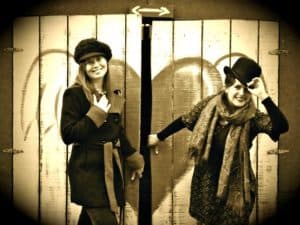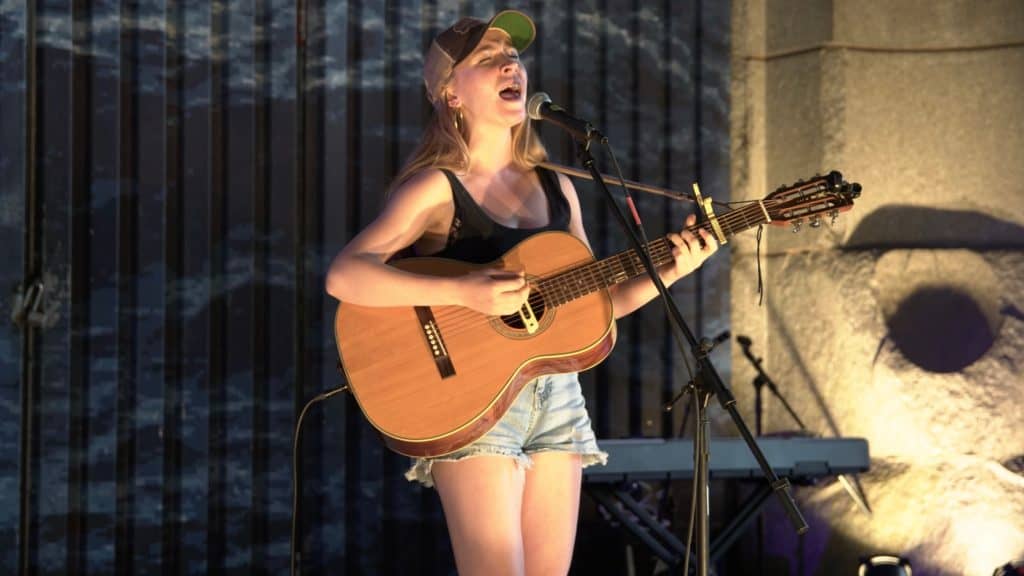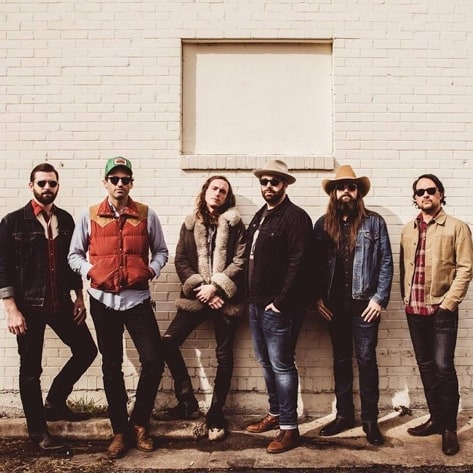The fifth annual Brooklyn Americana Festival is September 19 to 22 in several spots primarily surrounding the East River in Brooklyn, New York. Founded by Jan Bell (who has several albums and toured the United States and Europe in her own right), the Brooklyn Americana Festival is quickly establishing itself as a major artery of the Americana music establishment.
Brooklyn, named after the Dutch village of Breukelen and bordering the borough of Queens at the western end of Long Island, was once the home of Woody Guthrie, and his son Arlo Guthrie was born and raised here. There was a Brooklyn Country Music Festival that ran for 10 years, the Brooklyn Folk Festival is approaching 10 years and the list goes on. So when the New York Times and other New York journalists do their predictable “How ironic! Rootsy country music in New York City?” stories… well, knock it off already. This music is well established here.
Americana, as defined by the Americana Music Association (AMA), is “contemporary music that incorporates elements of various mostly acoustic American roots music styles, including country, roots rock, folk, gospel and bluegrass resulting in a distinctive roots-oriented sound that lives in a world apart from the pure forms of the genres upon which it may draw. While acoustic instruments are often present and vital, Americana also often uses a full electric band.”

In other words, Americana covers a lot of ground. Nowadays, the entire ‘70s singer-songwriter movement of James Taylor, Carole King, Jackson Browne, Joni Mitchell, Paul Simon, etc., can retroactively be deemed Americana as well as most country, folk, blues and all of bluegrass. Rock, hmm, well a lot of it can be, but oft angrier musical styles can be less acoustic as a total generalization. So, rap, metal and punk seem to have a smaller album collection that can fit under this Americana blanket. Pop music of this 2019 era seems to have little in common with Americana. But now let’s remember, all of the rock, pop, rap, metal, funk and punk that doesn’t fit, can all be recorded ironically by any Americana band. So, no song is safe!
We sat down with Americana musician Jan Bell, and she let us know how this festival got going, what it is and where it is going.
You are a musician who has toured all over. Why did you decide to start a festival?
I was that school kid that put on plays and would get everyone involved, like even the shyest kid could be in the play as a tree or a flower. I went on to study theater and storytelling. When I started traveling America with a folk musician, everywhere we went there was this whole folk tradition, campfire song circles, sitting on a porch playing music into the wee hours… and there was a bond because of the great American songbook. A few years later, when I first came to Dumbo, my friends Superfine had taken over the kitchen in the Between the Bridges iron workers’ bar. They had a line of customers out the door and asked me to help organize live music. It was 1998; the neighborhood was mostly empty warehouses, and a lot of us were living one step above squatting, really. I started a weekly open mic, and that gained some traction pretty fast – Elyas Khan and his outfit Nervous Cabaret started out there.

A good way to find common ground between folks from different walks of life is a tribute show. The first one honored Patsy Cline, then Johnny Cash, Hank Williams, Dolly Parton. What’s not to love? The bar was so packed that I moved the show outside and put the band on the back of the chef’s ‘64 Ford pickup truck. The following year Joy Glidden, the director of the Dumbo Art Under the Bridge Festival, offered me a loading dock to put bands on for the festival weekend. I did that for the next 13 years all over Dumbo – the Tobacco Warehouse where St. Ann’s Theatre is now; Under The Cottonwood Tree, where Jane’s Carousel is now; in 45 Main St., where the Fleuvog show shop is now. When Dumbo Art Festival folded six years ago, it was a natural step to keep the live music aspect going.
Would you like to throw us a few acts that have been getting a little extra buzz this year that are playing?

Leila Jane from Dublin just played a great stage at Glastonbury. A bunch of great songwriters from Austin, Texas: Jaimee Harris, Graham Weber and his band Western Youth, Rich Russell and his band Lonesome Heroes. Katy Rose, who used to be in the Maybelles with her new band, Tiger Alley. Queen Esther always raises the roof, and recently did a TED Talk on the origins of country music and black Americana, Sabine McCalla played solo last year and is bringing her band The Dew Drops up from New Orleans, where Offbeat Magazine named her “emerging artist of the year.” The Dew Drops are named after a speakeasy where black and white folks would gather during segregation. Ana Egge, who’s been described as a folk in a Simone, will play songs from her new album which Iris Dement is a guest on; Maggie Carson (Spirit Family Reunion). Jackson Lynch plays double duty with old-time trio The Down Hill Strugglers at Powerhouse Arena, and later on his rock n’ roll soul band on Saturday night at Superfine. The Wild Goats – Hilary Hawke, banjo player in Oklahoma on Broadway, and the intrepid actor and songwriter Jesse Lenat on guitar. Little Nora Brown kicks off the women’s stage on Pier 6 with Stephanie Coleman. Nora might be the youngest person to ever give a TED Talk and played banjo tunes from East Virginia.
How do you handle all of the submissions? I imagine it is hard to balance the artists you know personally along with all the other musicians from the US and abroad.
The hardest part is saying no to a band. I’m a longtime member of Folk Alliance International and have learned a lot from my elders and my peers in that community and have seen tons of brilliant musicians there. I almost never book a band before I’ve seen them live. The way they engage with the crowd – or lack thereof – is very telling. Anyone with deep pockets can have a fancy video or polished studio album. But what are you like offstage as well as when you’re in the spotlight? How are you with the venue staff and audience? The sound person? I try and reply to everyone who sends a well-crafted inquiry. But honestly, if you’re asking me if you can play the festival less than three months out, that’s just plain annoying. I’d never get anything done. Some folks even wrote asking me today.
I would literally never get anything done if I tried to find time to reply. Such a last-minute pitch tells me they are not fulltime, have not made that crucial choice, not touring, not in demand and so on – or they would have a realistic sense of how things work, and the timeline is one of the most vital components of being a performing artist. I earn a living as a bartender as well; when someone comes in asking if we’re hiring and it’s a Friday happy hour, it’s plain they haven’t got a clue. It happens a lot. If I have a chance, I’ll let on that earlier in the week is a better time if they want to get hired.
Has it changed the way you see your own music?
The fact that I can play guitar and sing at the same time is something I will always be working on, and practicing to do better by my band – especially leading one of my new songs. They’re the ones doing all the hard work.
My mantra is: sing the song for the sake of the song. I try to be true, honest, and brave.
As far as booking, sometimes my stuff just isn’t a good fit for a place. It’s important not to take it personally if a club says no thanks – or doesn’t get back to you; a lot of bookers are like me, with at least three jobs, and maybe they are an artist too, or a new parent trying to work from home.
What makes the Brooklyn Americana Festival different from other Americana Festivals?
This year is close to 70% artists that identify as women. It’s an urban music festival taking place in what were once considered out-of-the-way, dangerous neighborhoods. Now it’s hard for us artists to be able to afford to live any place even close to the waterfront. The audience is really a mix of all walks of life, all ages and it’s free. Everyone involved is paid a fair wage. That takes some doing, and it’s really the community I’ve been part of the last 20 years that supports this endeavor.
How do you think the high rents and cost of living in Brooklyn has affected the Brooklyn country and roots scene?
Well, in Dumbo, the visual artists were the first to go – the ones who had giant spaces with tons of light. Most of those have been divided now into way smaller studios, and a new wave of artists moved in, willing to pay the same rent for a shoe box. Us musicians can split the rent four or more ways for a dumpy dark basement rehearsal space. But as rents have tripled and quadrupled, musicians are being paid around the same as we were five, even 10 years ago. When The Maybelles first went to Europe, I asked The Wiyos for advice. They said CD sales were a huge part of earnings, and they were right. That was 10 years ago… and nowadays folks often don’t have any cash anymore to tip the band. So, some bands are on top of that with signage that makes it easy for fans to tip online. The festival venues have all cultivated a tradition of tipping the bands in cash, and I’ll be sad to see that go as we move toward a cashless society. If someone wants to tip big, I think that’s a private exchange of their own free will, and nobody else’s business really.
Americana was not considered a genre in the ‘70s, ‘80s. Now they are calling Neil Young’s Harvest Americana and anything by Gram Parsons; they used to be called country rock. So, what the hell is Americana?
Americana involves a high level of original songwriting, even a love of poetry, or at least an awareness of it – not as an exclusive academic art – but as another platform for the people’s voice.
There are upright basses rather than electric ones; a full drum kit is not a must. There is an understanding of the roots of folk, blues, bluegrass, a genuine interest in the history and the lives of the ones who have gone before us down the road.
Are The Eagles Americana?
Hmm…well those harmonies put them in the running, but I’d still say they are classic American folk rock.
The Grateful Dead?
No, they are their own genre.
Brad Paisley?
No, commercial country.
What would you like to see differently for the 10th Annual BKAMF?
I’d love to have a solar-powered and wind-powered stage. I’d love to see stationary bicycles for parents and kids by the stage that power up electric equipment – like the little girl’s bike powers up the bass amp, dad’s bike powers the foot lights or something like that. I would like to see great attendance but not crazy crowded. I have a lot of friends I met along the way, starting out around the same time who have gone on to play the Royal Albert hall, Lincoln Center, and command main stages worldwide. I’d bet my bottom dollar some of the artists playing this year will rise to that level. And I hope they come back in year 10 and I can gladly give them their going rate.
For tickets and information go to http://www.bkamf.com










